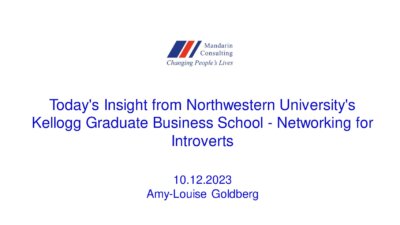12.10.2023 Today’s Insight from Northwestern University’s Kellogg Graduate Business School – Networking for Introverts

Dear Students,
With all due respect to our wonderful global coaches and their ongoing encouragement of student efforts, networking, or more appropriately, the concept of networking (more so than the actual practice) can strike fear in the hearts of some of you, who were raised in a country where a student would never contact a seasoned professional who had merely attended the same college, simply to chat over coffee.
The idea of networking can be especially uncomfortable among introverts, some of you ambitious international students who lean toward the ‘soft-spoken.’ You may be a particularly observant female college freshman or a highly-analytical male Master’s student, and nonetheless be very motivated, despite your preference for listening. (Depending on the source, anywhere from 30%-50% of Americans are introverts, and a recent China Daily survey identified that nearly 27% of Chinese age 18-35 surveyed “have difficulty with real-life social interaction.”). What’s more, as Kellogg Professor Leigh Thompson notes in the above piece, it’s common for people to generally believe that being more outgoing and verbal tends to make someone more successful.
However, she writes that “research increasingly shows that effective leadership involves qualities like listening, reflection, focus, and self-management—all areas where introverts typically excel.” These are key components of emotional intelligence, which introverts like you or your friends may often have in spades. Self-awareness, Dr. Thompson notes, is especially important for introverted yet aspiring professionals, so as to monitor and adapt your energy and intensity as needed. She also alludes to a significant point – that leveraging curiosity (a sought-after competency among global companies) may allow an introvert like you to shift a high-intensity interaction back to an extrovert, who would actually be quite happy to continue talking. At the same time, Dr. Thompson suggests that introverts (that may be you!) would benefit from stretching yourself to extend your comfort zone, and to become more comfortable acting more extroverted, which may be valued or even expected of new grads in some business contexts.
The article also includes a great tip for addressing the “what do you do?” question, which you may have already noticed often arises within networking contexts.
Overall, what matters most is for introverts like you to recognize your nature and to channel its benefits, while approaching communication with a continuous learning mindset.